Historical Periods: Examining Sociological Relations and Impacts
VerifiedAdded on 2023/03/17
|5
|1424
|48
Essay
AI Summary
This essay delves into the relationship between various historical periods, examining the sociological impacts of pivotal works and the revolutionary ideas they introduced. The study analyzes the contributions of John Calvin, John Locke, Friedrich Nietzsche, and Martin Luther King Jr., highlighting how their writings challenged existing governmental systems and advocated for social justice through revolutionary means. The essay explores the concept of Calvinism and its influence on religious and political landscapes, Locke's advocacy for democracy and the protection of individual rights, Nietzsche's exploration of the 'death of God' and the concept of the Dionysian, and King's promotion of nonviolent protest for fundamental rights. The common thread among these works is their focus on social change through revolutions and movements. This assignment provides valuable insights into how historical periods have shaped societies and the importance of revolutionary thought in achieving social justice.
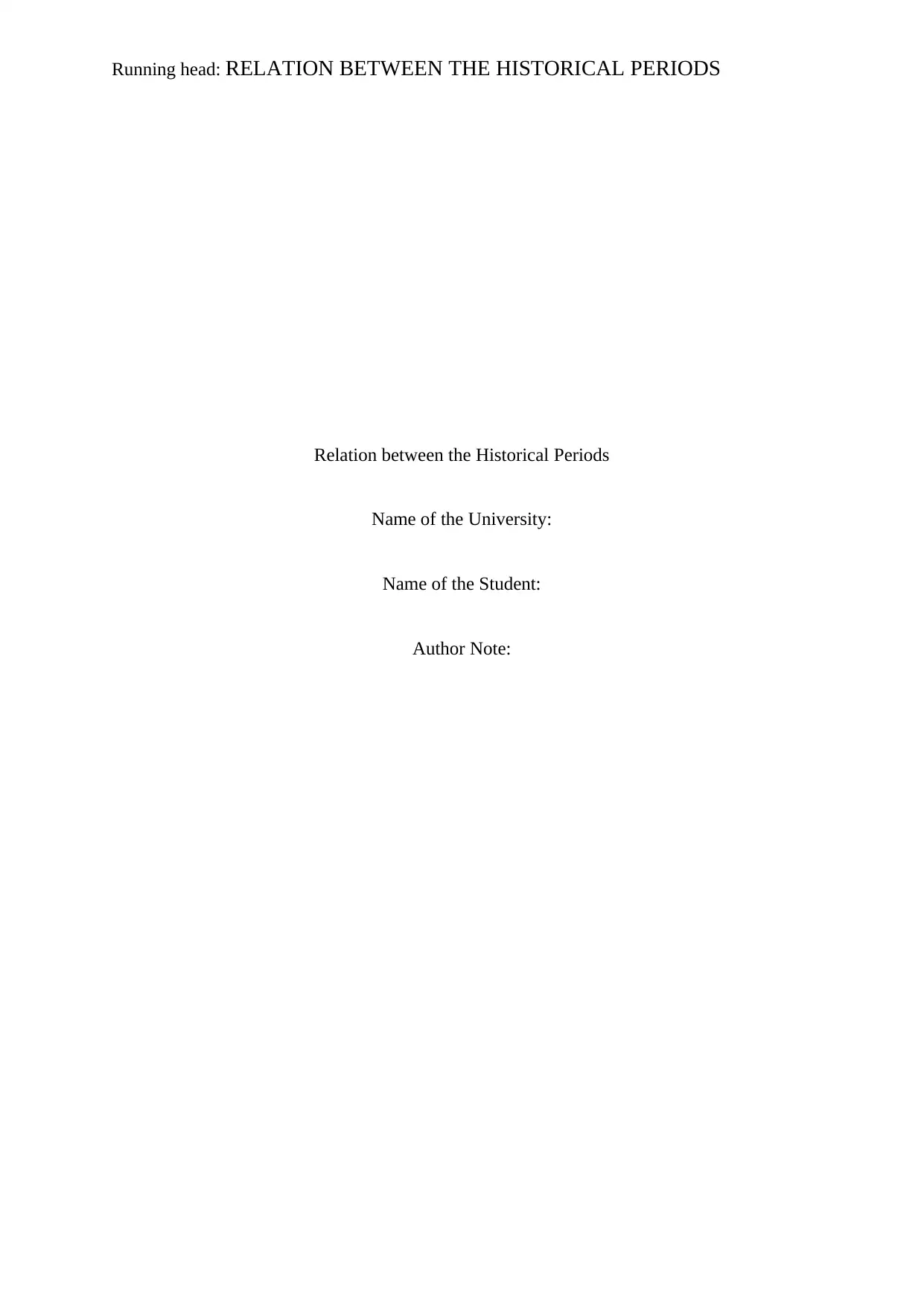
Running head: RELATION BETWEEN THE HISTORICAL PERIODS
Relation between the Historical Periods
Name of the University:
Name of the Student:
Author Note:
Relation between the Historical Periods
Name of the University:
Name of the Student:
Author Note:
Paraphrase This Document
Need a fresh take? Get an instant paraphrase of this document with our AI Paraphraser
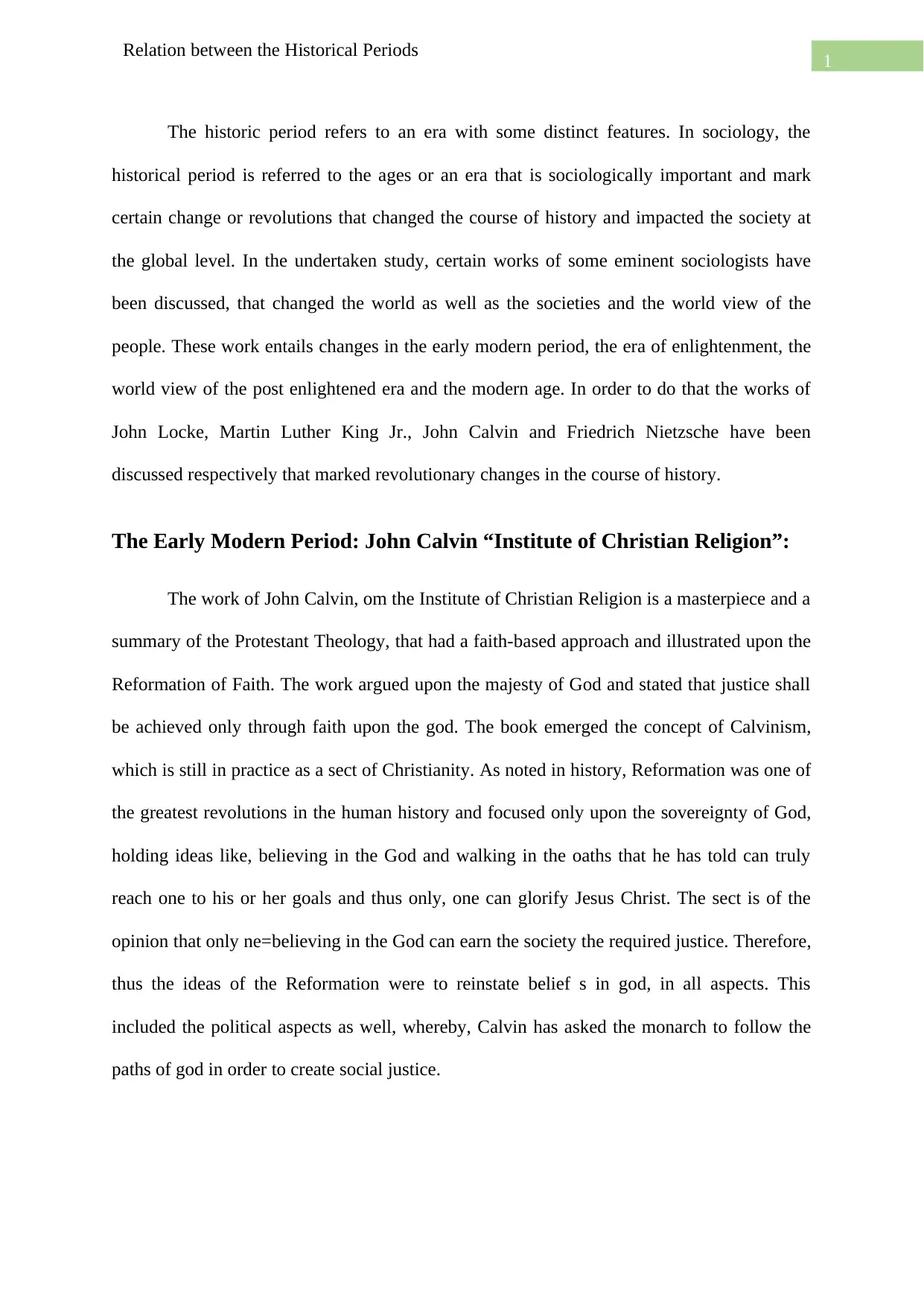
1
Relation between the Historical Periods
The historic period refers to an era with some distinct features. In sociology, the
historical period is referred to the ages or an era that is sociologically important and mark
certain change or revolutions that changed the course of history and impacted the society at
the global level. In the undertaken study, certain works of some eminent sociologists have
been discussed, that changed the world as well as the societies and the world view of the
people. These work entails changes in the early modern period, the era of enlightenment, the
world view of the post enlightened era and the modern age. In order to do that the works of
John Locke, Martin Luther King Jr., John Calvin and Friedrich Nietzsche have been
discussed respectively that marked revolutionary changes in the course of history.
The Early Modern Period: John Calvin “Institute of Christian Religion”:
The work of John Calvin, om the Institute of Christian Religion is a masterpiece and a
summary of the Protestant Theology, that had a faith-based approach and illustrated upon the
Reformation of Faith. The work argued upon the majesty of God and stated that justice shall
be achieved only through faith upon the god. The book emerged the concept of Calvinism,
which is still in practice as a sect of Christianity. As noted in history, Reformation was one of
the greatest revolutions in the human history and focused only upon the sovereignty of God,
holding ideas like, believing in the God and walking in the oaths that he has told can truly
reach one to his or her goals and thus only, one can glorify Jesus Christ. The sect is of the
opinion that only ne=believing in the God can earn the society the required justice. Therefore,
thus the ideas of the Reformation were to reinstate belief s in god, in all aspects. This
included the political aspects as well, whereby, Calvin has asked the monarch to follow the
paths of god in order to create social justice.
Relation between the Historical Periods
The historic period refers to an era with some distinct features. In sociology, the
historical period is referred to the ages or an era that is sociologically important and mark
certain change or revolutions that changed the course of history and impacted the society at
the global level. In the undertaken study, certain works of some eminent sociologists have
been discussed, that changed the world as well as the societies and the world view of the
people. These work entails changes in the early modern period, the era of enlightenment, the
world view of the post enlightened era and the modern age. In order to do that the works of
John Locke, Martin Luther King Jr., John Calvin and Friedrich Nietzsche have been
discussed respectively that marked revolutionary changes in the course of history.
The Early Modern Period: John Calvin “Institute of Christian Religion”:
The work of John Calvin, om the Institute of Christian Religion is a masterpiece and a
summary of the Protestant Theology, that had a faith-based approach and illustrated upon the
Reformation of Faith. The work argued upon the majesty of God and stated that justice shall
be achieved only through faith upon the god. The book emerged the concept of Calvinism,
which is still in practice as a sect of Christianity. As noted in history, Reformation was one of
the greatest revolutions in the human history and focused only upon the sovereignty of God,
holding ideas like, believing in the God and walking in the oaths that he has told can truly
reach one to his or her goals and thus only, one can glorify Jesus Christ. The sect is of the
opinion that only ne=believing in the God can earn the society the required justice. Therefore,
thus the ideas of the Reformation were to reinstate belief s in god, in all aspects. This
included the political aspects as well, whereby, Calvin has asked the monarch to follow the
paths of god in order to create social justice.
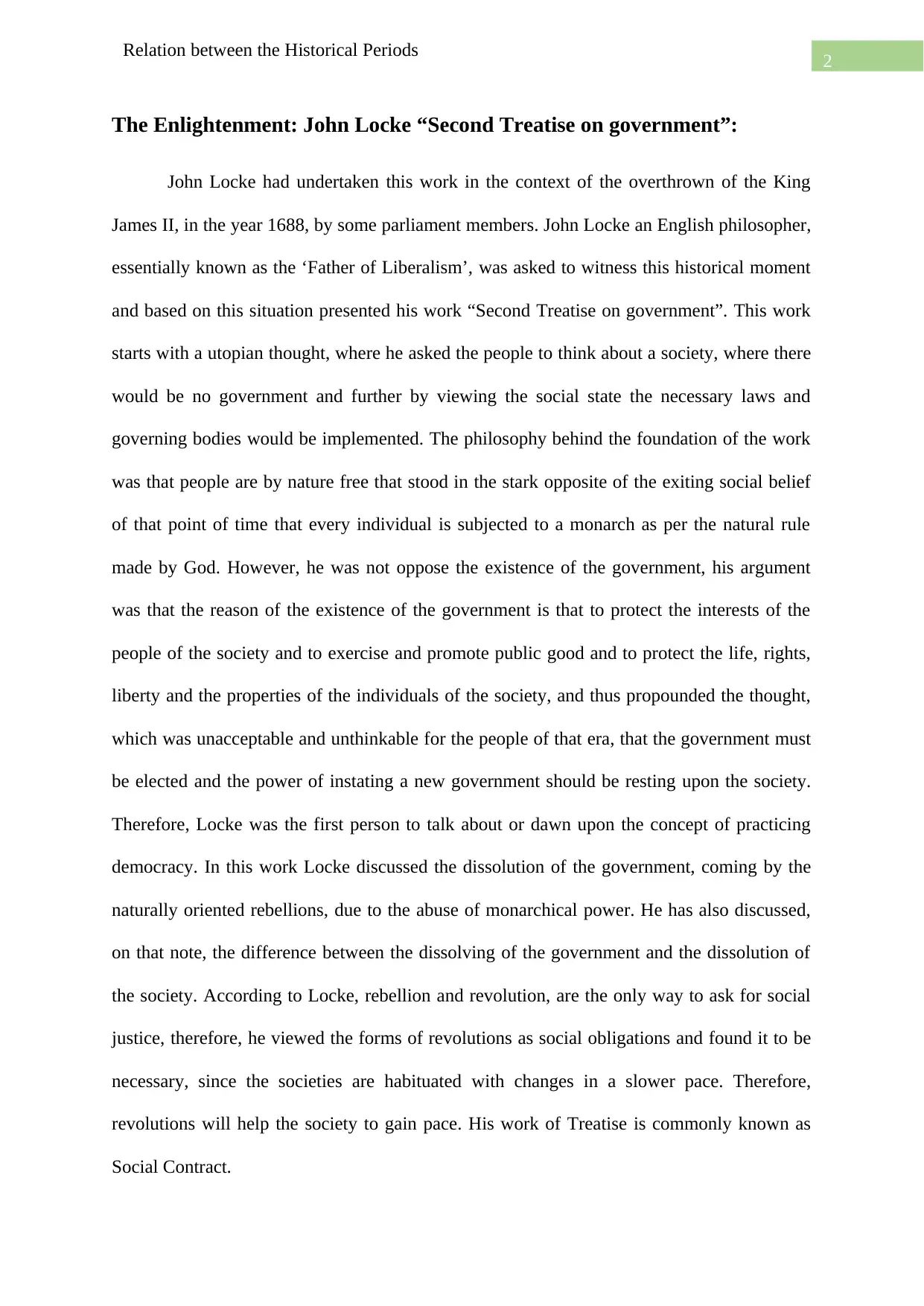
2
Relation between the Historical Periods
The Enlightenment: John Locke “Second Treatise on government”:
John Locke had undertaken this work in the context of the overthrown of the King
James II, in the year 1688, by some parliament members. John Locke an English philosopher,
essentially known as the ‘Father of Liberalism’, was asked to witness this historical moment
and based on this situation presented his work “Second Treatise on government”. This work
starts with a utopian thought, where he asked the people to think about a society, where there
would be no government and further by viewing the social state the necessary laws and
governing bodies would be implemented. The philosophy behind the foundation of the work
was that people are by nature free that stood in the stark opposite of the exiting social belief
of that point of time that every individual is subjected to a monarch as per the natural rule
made by God. However, he was not oppose the existence of the government, his argument
was that the reason of the existence of the government is that to protect the interests of the
people of the society and to exercise and promote public good and to protect the life, rights,
liberty and the properties of the individuals of the society, and thus propounded the thought,
which was unacceptable and unthinkable for the people of that era, that the government must
be elected and the power of instating a new government should be resting upon the society.
Therefore, Locke was the first person to talk about or dawn upon the concept of practicing
democracy. In this work Locke discussed the dissolution of the government, coming by the
naturally oriented rebellions, due to the abuse of monarchical power. He has also discussed,
on that note, the difference between the dissolving of the government and the dissolution of
the society. According to Locke, rebellion and revolution, are the only way to ask for social
justice, therefore, he viewed the forms of revolutions as social obligations and found it to be
necessary, since the societies are habituated with changes in a slower pace. Therefore,
revolutions will help the society to gain pace. His work of Treatise is commonly known as
Social Contract.
Relation between the Historical Periods
The Enlightenment: John Locke “Second Treatise on government”:
John Locke had undertaken this work in the context of the overthrown of the King
James II, in the year 1688, by some parliament members. John Locke an English philosopher,
essentially known as the ‘Father of Liberalism’, was asked to witness this historical moment
and based on this situation presented his work “Second Treatise on government”. This work
starts with a utopian thought, where he asked the people to think about a society, where there
would be no government and further by viewing the social state the necessary laws and
governing bodies would be implemented. The philosophy behind the foundation of the work
was that people are by nature free that stood in the stark opposite of the exiting social belief
of that point of time that every individual is subjected to a monarch as per the natural rule
made by God. However, he was not oppose the existence of the government, his argument
was that the reason of the existence of the government is that to protect the interests of the
people of the society and to exercise and promote public good and to protect the life, rights,
liberty and the properties of the individuals of the society, and thus propounded the thought,
which was unacceptable and unthinkable for the people of that era, that the government must
be elected and the power of instating a new government should be resting upon the society.
Therefore, Locke was the first person to talk about or dawn upon the concept of practicing
democracy. In this work Locke discussed the dissolution of the government, coming by the
naturally oriented rebellions, due to the abuse of monarchical power. He has also discussed,
on that note, the difference between the dissolving of the government and the dissolution of
the society. According to Locke, rebellion and revolution, are the only way to ask for social
justice, therefore, he viewed the forms of revolutions as social obligations and found it to be
necessary, since the societies are habituated with changes in a slower pace. Therefore,
revolutions will help the society to gain pace. His work of Treatise is commonly known as
Social Contract.
⊘ This is a preview!⊘
Do you want full access?
Subscribe today to unlock all pages.

Trusted by 1+ million students worldwide
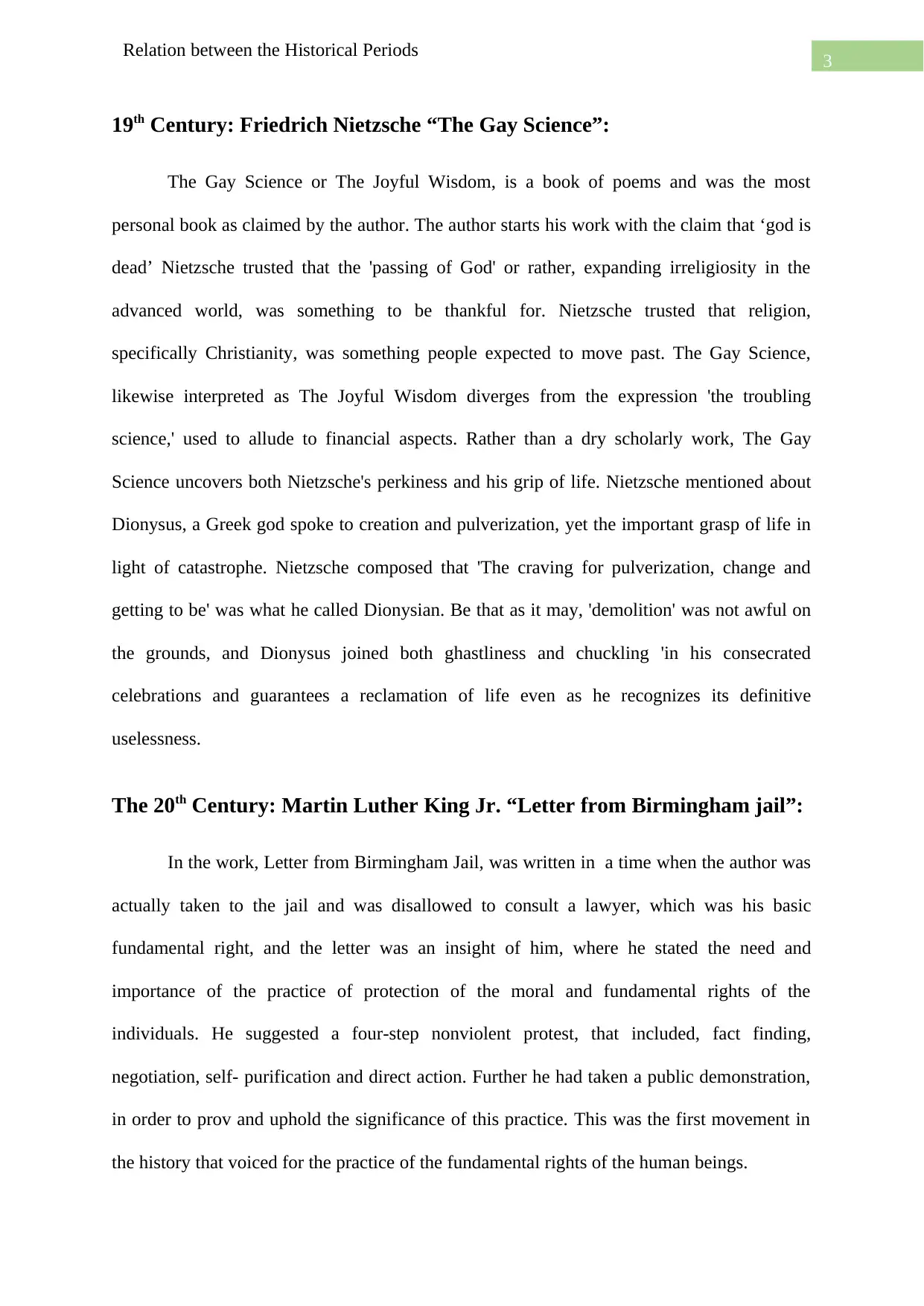
3
Relation between the Historical Periods
19th Century: Friedrich Nietzsche “The Gay Science”:
The Gay Science or The Joyful Wisdom, is a book of poems and was the most
personal book as claimed by the author. The author starts his work with the claim that ‘god is
dead’ Nietzsche trusted that the 'passing of God' or rather, expanding irreligiosity in the
advanced world, was something to be thankful for. Nietzsche trusted that religion,
specifically Christianity, was something people expected to move past. The Gay Science,
likewise interpreted as The Joyful Wisdom diverges from the expression 'the troubling
science,' used to allude to financial aspects. Rather than a dry scholarly work, The Gay
Science uncovers both Nietzsche's perkiness and his grip of life. Nietzsche mentioned about
Dionysus, a Greek god spoke to creation and pulverization, yet the important grasp of life in
light of catastrophe. Nietzsche composed that 'The craving for pulverization, change and
getting to be' was what he called Dionysian. Be that as it may, 'demolition' was not awful on
the grounds, and Dionysus joined both ghastliness and chuckling 'in his consecrated
celebrations and guarantees a reclamation of life even as he recognizes its definitive
uselessness.
The 20th Century: Martin Luther King Jr. “Letter from Birmingham jail”:
In the work, Letter from Birmingham Jail, was written in a time when the author was
actually taken to the jail and was disallowed to consult a lawyer, which was his basic
fundamental right, and the letter was an insight of him, where he stated the need and
importance of the practice of protection of the moral and fundamental rights of the
individuals. He suggested a four-step nonviolent protest, that included, fact finding,
negotiation, self- purification and direct action. Further he had taken a public demonstration,
in order to prov and uphold the significance of this practice. This was the first movement in
the history that voiced for the practice of the fundamental rights of the human beings.
Relation between the Historical Periods
19th Century: Friedrich Nietzsche “The Gay Science”:
The Gay Science or The Joyful Wisdom, is a book of poems and was the most
personal book as claimed by the author. The author starts his work with the claim that ‘god is
dead’ Nietzsche trusted that the 'passing of God' or rather, expanding irreligiosity in the
advanced world, was something to be thankful for. Nietzsche trusted that religion,
specifically Christianity, was something people expected to move past. The Gay Science,
likewise interpreted as The Joyful Wisdom diverges from the expression 'the troubling
science,' used to allude to financial aspects. Rather than a dry scholarly work, The Gay
Science uncovers both Nietzsche's perkiness and his grip of life. Nietzsche mentioned about
Dionysus, a Greek god spoke to creation and pulverization, yet the important grasp of life in
light of catastrophe. Nietzsche composed that 'The craving for pulverization, change and
getting to be' was what he called Dionysian. Be that as it may, 'demolition' was not awful on
the grounds, and Dionysus joined both ghastliness and chuckling 'in his consecrated
celebrations and guarantees a reclamation of life even as he recognizes its definitive
uselessness.
The 20th Century: Martin Luther King Jr. “Letter from Birmingham jail”:
In the work, Letter from Birmingham Jail, was written in a time when the author was
actually taken to the jail and was disallowed to consult a lawyer, which was his basic
fundamental right, and the letter was an insight of him, where he stated the need and
importance of the practice of protection of the moral and fundamental rights of the
individuals. He suggested a four-step nonviolent protest, that included, fact finding,
negotiation, self- purification and direct action. Further he had taken a public demonstration,
in order to prov and uphold the significance of this practice. This was the first movement in
the history that voiced for the practice of the fundamental rights of the human beings.
Paraphrase This Document
Need a fresh take? Get an instant paraphrase of this document with our AI Paraphraser
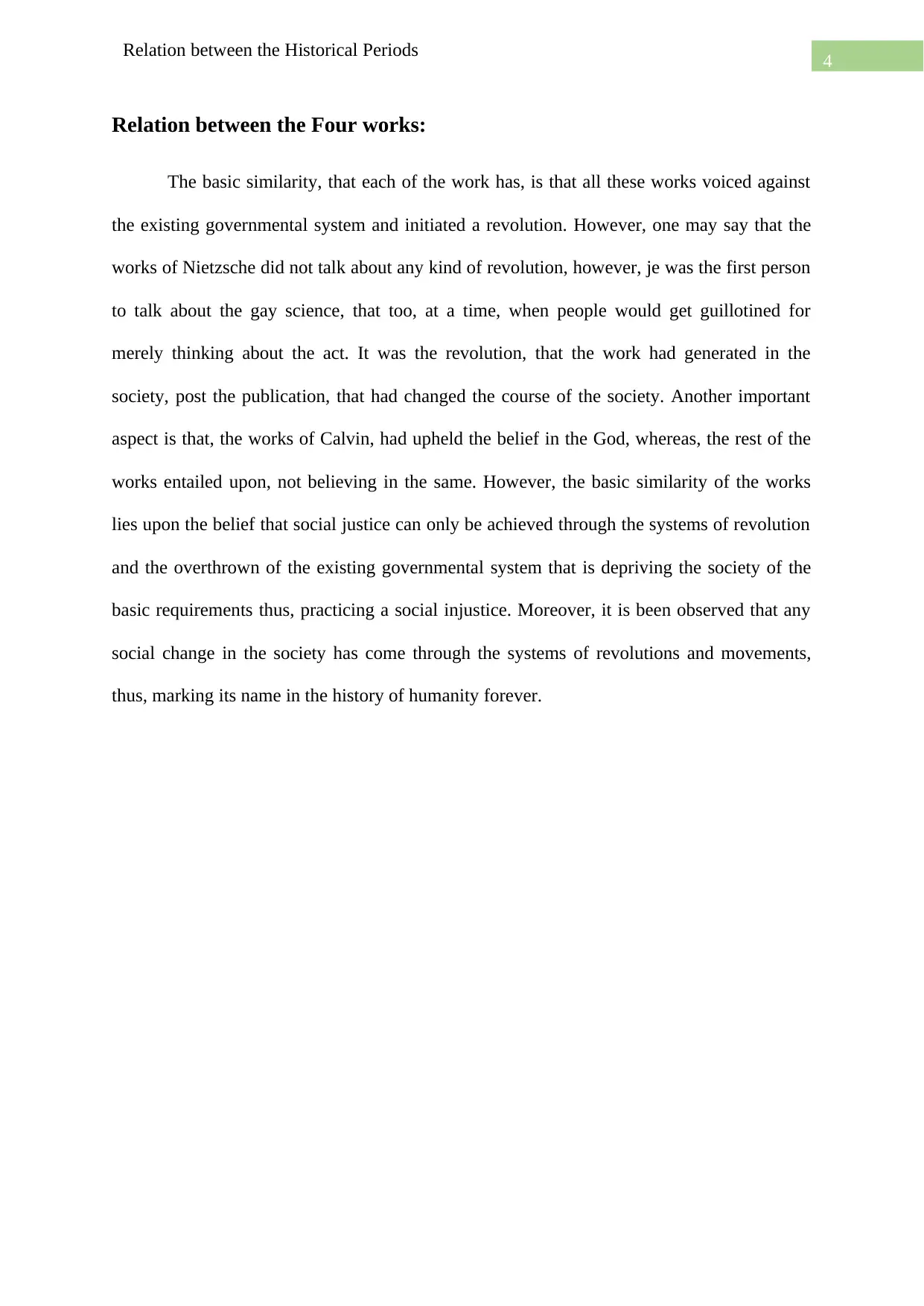
4
Relation between the Historical Periods
Relation between the Four works:
The basic similarity, that each of the work has, is that all these works voiced against
the existing governmental system and initiated a revolution. However, one may say that the
works of Nietzsche did not talk about any kind of revolution, however, je was the first person
to talk about the gay science, that too, at a time, when people would get guillotined for
merely thinking about the act. It was the revolution, that the work had generated in the
society, post the publication, that had changed the course of the society. Another important
aspect is that, the works of Calvin, had upheld the belief in the God, whereas, the rest of the
works entailed upon, not believing in the same. However, the basic similarity of the works
lies upon the belief that social justice can only be achieved through the systems of revolution
and the overthrown of the existing governmental system that is depriving the society of the
basic requirements thus, practicing a social injustice. Moreover, it is been observed that any
social change in the society has come through the systems of revolutions and movements,
thus, marking its name in the history of humanity forever.
Relation between the Historical Periods
Relation between the Four works:
The basic similarity, that each of the work has, is that all these works voiced against
the existing governmental system and initiated a revolution. However, one may say that the
works of Nietzsche did not talk about any kind of revolution, however, je was the first person
to talk about the gay science, that too, at a time, when people would get guillotined for
merely thinking about the act. It was the revolution, that the work had generated in the
society, post the publication, that had changed the course of the society. Another important
aspect is that, the works of Calvin, had upheld the belief in the God, whereas, the rest of the
works entailed upon, not believing in the same. However, the basic similarity of the works
lies upon the belief that social justice can only be achieved through the systems of revolution
and the overthrown of the existing governmental system that is depriving the society of the
basic requirements thus, practicing a social injustice. Moreover, it is been observed that any
social change in the society has come through the systems of revolutions and movements,
thus, marking its name in the history of humanity forever.
1 out of 5
Your All-in-One AI-Powered Toolkit for Academic Success.
+13062052269
info@desklib.com
Available 24*7 on WhatsApp / Email
![[object Object]](/_next/static/media/star-bottom.7253800d.svg)
Unlock your academic potential
Copyright © 2020–2026 A2Z Services. All Rights Reserved. Developed and managed by ZUCOL.